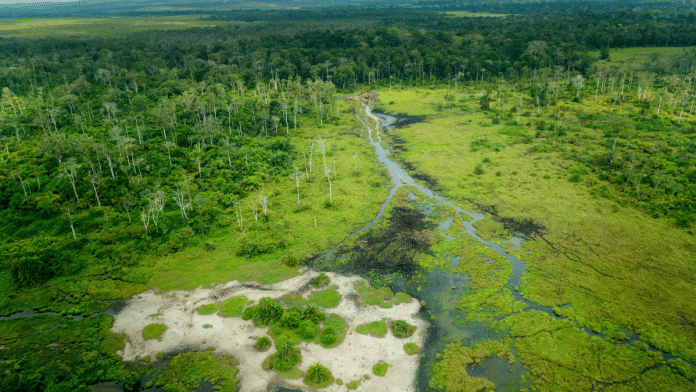The Congo Basin, a region of tropical forest larger than India, is at a point where further damage may rob the world of a crucial bulwark against climate change.
That’s the conclusion of the first comprehensive scientific report about the state of the environment in a region that stretches from Cross River in Nigeria to the Rift Valley in East Africa. An executive summary of the 800-page report, authored by 177 experts from across the basin and beyond, was released Monday for the COP 30 climate summit in Belém, Brazil.
The region’s forests currently absorb 600 million tons of planet-warming carbon dioxide a year, equivalent to Germany’s emissions. That makes the basin the world’s biggest tropical carbon sink. But deforestation is threatening to upend the forests’ ability to remove carbon from the atmosphere, a shift that would endanger the world’s climate.
“If we don’t get a handle on it in the next decade, it will be out of control,” Lee White, Gabon’s former environment minister, said in an interview. “There’s a huge problem developing that we aren’t solving and a huge opportunity that we’re missing.”
Two decades ago, the Congo Basin absorbed 4.5 billion tons of carbon, almost equal to what the US emits, according to White. But slash-and-burn agriculture, where farmers set fires to create room for crops, an increase in logging and rising demand for charcoal are shrinking the forests.

“The Congo Basin stands at a decisive crossroads,” the scientists said in the report, which was inspired by a similar publication on the Amazon region released at the 2021 COP meeting. It’s home to “unparalleled biodiversity, but it’s also a region of rapid population growth, persistent poverty, weak governance and competing demands for development.”
The Amazon in some ways serves as a warning for the Congo Basin. The forest covers an area twice, but parts of the region have become a source of emissions rather than a sink, mainly due to deforestation. The world’s other carbon sinks, including permafrost and northern forests, also are under threat as the planet warms.
In addition to its role battling climate change, the Congo Basin is a key driver of rainfall patterns across Africa, including Egypt and water-stressed nations across east, west and north Africa. About 70% of the precipitation that falls over the basin is recycled into the atmosphere and then falls again across the broader region.
“If you lose the Congo Basin, you lose the water,” said White, a British scientist who found his way to Gabon’s cabinet after coming to the country to do doctoral research in 1989.
While he lost his post as environment minister in a military coup a few months after the Science Panel for the Congo Basin’s creation in 2023, his fellow scientists chose him as envoy, a recognition of his role in pioneering attempts to win carbon-offset funding to reward Gabon for keeping its forests intact.
The state of African forests varies from Gabon, where about 90% of the land is covered by trees, to the Democratic Republic of Congo, where slash-and burn agriculture is prevalent and the forest is under pressure from a population of more than 100 million people.
“There is an urgent need to banish the persistent contradiction that defines the Congo Basin economies,” the scientists wrote in their report. “Forests and renewable resources sustain millions and state revenues are heavily tied to non-renewables — mining and oil.”
The scientists called for a range of interventions to halt the forests’ decline in the region, including more sustainable-farming practices and innovative climate finance. The latter is a top issue at COP30, with Brazil’s newly created Tropical Forest Forever Facility receiving roughly $5 billion in pledges ahead of climate talks kicking off on Monday. Nations with tropical forests will receive a fee for every hectare conserved, and the Democratic Republic of Congo is among those that would benefit the most.
“The Congo Basin has historically received less international forest finance than the Amazon or Southeast Asia,” they said. “Closing this gap requires a portfolio approach,” which would include higher outlays from governments and increasing proceeds from the sale of carbon and biodiversity credits.
“With the right incentives, through carbon markets and other mechanisms, the Congo Basin should receive tens of billions of dollars for carbon storage,” they said.
(Reporting by Antony Sguazzin. With assistance from Paul Richardson.)
This report is auto-generated from Bloomberg news service. ThePrint holds no responsibility for its content.
Also read: Various indigenous leaders reach Brazil a day before COP-30 Summit, demand their voice be included






